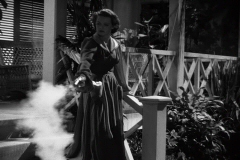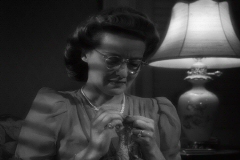|
Newest Reviews:
New Movies -
The Tunnel
V/H/S
The Tall Man
Mama Africa
Detention
Brake
Ted
Tomboy
Brownian Movement
Last Ride
[Rec]³: Genesis
Hara-Kiri: Death of a Samurai
Indie Game: The Movie
Abraham Lincoln: Vampire Hunter
Old Movies -
Touki Bouki: The Journey of the Hyena
Drums Along the Mohawk
The Chase
The Heiress
Show
People
The Strange Affair of Uncle Harry
Pitfall
Driftwood
Miracle Mile
The Great Flamarion
Dark Habits
Archives -
Recap: 2000,
2001, 2002,
2003, 2004
, 2005, 2006,
2007 , 2008
, 2009 ,
2010 , 2011 ,
2012
All reviews alphabetically
All reviews by star rating
All reviews by release year
Masterpieces
Screening Log
Links
FAQ
E-mail me
HOME
| |
The Letter (William Wyler, 1940)
 Based on a short story by W. Somerset Maugham, William
Wyler’s adaptation of The Letter is better for knowing that it’s a
“small” movie. Set in a series of sitting rooms, the overly genteel film
allows us to examine the standards of the insular society that’s scandalized
by its melodramatic plot. Wyler’s typical style, dominated by long, deep-focus
shots, is in effect here, and as a result its scenes of interrogation seem less
like an assault on the defendant than an examination of the process by which she
is acquitted that implicates the colonial social order. Despite, this seeming
ensemble focus, however, the film is a perfect vehicle for its star, Bette
Davis. Leslie Crosbie, the hypocritical, high-society murderess she plays is
well suited to her screen persona, which has always been more a mixture of cool
intelligence and extreme standoffishness than sexual attractiveness. The shots
Wyler includes of her fastidiously knitting her lace reveal her shrewd,
calculating nature as much as any twist in the plot. That's partially because The
Letter’s plot is thoroughly unexceptional. The rather routine courtroom
drama it spells out is really an excuse for its examination of its leading
lady’s two-faced nature. Bored with her husband, bored with her lover, yet
incredibly possessive of both, her character is defined by the clash between her
upper-class pride and her less refined sexual impulses.
Based on a short story by W. Somerset Maugham, William
Wyler’s adaptation of The Letter is better for knowing that it’s a
“small” movie. Set in a series of sitting rooms, the overly genteel film
allows us to examine the standards of the insular society that’s scandalized
by its melodramatic plot. Wyler’s typical style, dominated by long, deep-focus
shots, is in effect here, and as a result its scenes of interrogation seem less
like an assault on the defendant than an examination of the process by which she
is acquitted that implicates the colonial social order. Despite, this seeming
ensemble focus, however, the film is a perfect vehicle for its star, Bette
Davis. Leslie Crosbie, the hypocritical, high-society murderess she plays is
well suited to her screen persona, which has always been more a mixture of cool
intelligence and extreme standoffishness than sexual attractiveness. The shots
Wyler includes of her fastidiously knitting her lace reveal her shrewd,
calculating nature as much as any twist in the plot. That's partially because The
Letter’s plot is thoroughly unexceptional. The rather routine courtroom
drama it spells out is really an excuse for its examination of its leading
lady’s two-faced nature. Bored with her husband, bored with her lover, yet
incredibly possessive of both, her character is defined by the clash between her
upper-class pride and her less refined sexual impulses.
 The opening scene of The Letter, which features the
murder that sets the plot in motion, is incredibly atmospheric. Though the
preponderance of studio sets keeps the atmosphere from sustaining such heights
throughout, the film hardly suffers because the explosive first scene makes it
clear how much Bette Davis’ character is repressing throughout the rest of the
film. As other characters attempt to make excuses for her and try to deny the
existence of her interior passions, she plays along, until another woman finally
intuits the truth about what happened. Though the overly moralistic ending
differs from the source material, The Letter really only has two great
liabilities. The first is Max Steiner’s wretched score, which pours syrup over
the ambiguities that Wyler strains to create. It underscores scene after scene,
deadening the atmosphere where the film needs it most and adding unnecessarily
“exotic” Asian melodies at every other turn. The second liability, which
probably hurts the film less than the first, is the existence of Lewis
Milestone’s excellent Rain. Similarly based on a Maugham story set in a
far-off locale, it is twice as sultry and twice as effective a condemnation of
sexual hypocrisy.
The opening scene of The Letter, which features the
murder that sets the plot in motion, is incredibly atmospheric. Though the
preponderance of studio sets keeps the atmosphere from sustaining such heights
throughout, the film hardly suffers because the explosive first scene makes it
clear how much Bette Davis’ character is repressing throughout the rest of the
film. As other characters attempt to make excuses for her and try to deny the
existence of her interior passions, she plays along, until another woman finally
intuits the truth about what happened. Though the overly moralistic ending
differs from the source material, The Letter really only has two great
liabilities. The first is Max Steiner’s wretched score, which pours syrup over
the ambiguities that Wyler strains to create. It underscores scene after scene,
deadening the atmosphere where the film needs it most and adding unnecessarily
“exotic” Asian melodies at every other turn. The second liability, which
probably hurts the film less than the first, is the existence of Lewis
Milestone’s excellent Rain. Similarly based on a Maugham story set in a
far-off locale, it is twice as sultry and twice as effective a condemnation of
sexual hypocrisy.
64
Jeremy Heilman
03-07-05
|